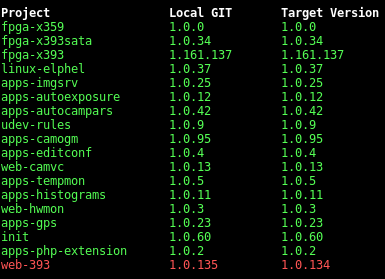Poky manual
From ElphelWiki
Contents
[hide]Use cases
- Linux kernel update when adding/developing a driver
- When an application needs to be included into the firmware image archive
- Update Elphel's PHP extension
- C/C++ applications if developed on PC require a cross-compiler and require Yocto installation or some other alternative.
Other projects that use Python, PHP, Javascript, HTML, C/C++ on hardware (compiler is included in the firmware image) do not require this SDK use but it makes the process more convenient, e.g. by copying the built packages straight to the target hardware.
Description
- Building embedded Linux image for Zynq ARMv7 platform - Elphel 10393 board
- Yocto Poky revision = 2.6 (Thud)
- Yocto Poky revision = 2.4 (Rocko)
-
Yocto Poky revision = 2.0 (Jethro)
Features
- Environment is set up with a single script
- All Elphel projects are configured for Eclipse IDE:
- fpga projects (verilog)
- kernel
- applications projects
- All steps for fpga projects are run from Eclipse IDE
- Once everything is built it supports updating software projects (files and binaries) on the target system
- access is set up in yocto's local.conf (see setup.py output) + ssh-copy-id
- bitbake some-app -c target_scp from the command line or Eclipse IDE - see examples in elphel-apps-... at Git
Requirements
- Kubuntu 16.04 x64 (as of Dec 2018) for Poky 2.4 Rocko
- Kubuntu 18.04 x64 (as of Dec 2018)
- For Poky 2.6 Thud see Yocto Project Poky 2.6 mega-manual
Output files
The names are listed as they appear in the u-boot configuration header file - actual output files have different names:
| File(s) | Description |
|---|---|
| boot.bin | u-boot as the first stage bootloader = Secondary Program Loader (SPL) that boots u-boot-dtb.img |
| u-boot-dtb.img | full size u-boot with a stripped device tree (cat u-boot.img some_stripped_devicetree.dtb > u-boot-dtb.img) |
| devicetree.dtb | device tree with listed interfaces, zynq registers, interrupts and drivers
|
| uImage | kernel, drivers |
| rootfs.ubifs, rootfs.ubi, rootfs.tar.gz | rootfs in different formats - *.ubi* for NAND, *.tar.gz for mmc |
The file are located at elphel393/bootable-images/, which is a link to poky's deploy directory elphel393/poky/build/tmp/deploy/images/elphel393/
- complete set of files for rootfs in NAND Flash: elphel393/bootable-images/nand/
- complete set of files for rootfs on MMC (micro SD card): elphel393/bootable-images/mmc/
Write files to media and boot
Boot from micro SD card
- Use recovery or regular μSD card
- EXT4 partition mounted as /
Boot from NAND flash
- The default boot option - power on.
- A UBIFS image is written to /dev/mtd4 - is mounted as /
Notes
- Read more about boot options.
Setup
- Poky 2.4 Rocko (Kubuntu 16.04)
git clone -b rocko https://git.elphel.com/Elphel/elphel393.git cd elphel393 ./setup.py cd poky . ./oe-init-build-env bitbake u-boot device-tree linux-xlnx core-image-elphel393
Temporary: linux-xlnx in Rocko depends on branch 'lwir' for x393. Change in projects.json line 42 from 'master' to 'lwir'.
- Poky 2.6 Thud (Kubuntu 18.04)
git clone -b thud https://git.elphel.com/Elphel/elphel393.git cd elphel393 ./setup.py cd poky . ./oe-init-build-env bitbake u-boot device-tree linux-xlnx core-image-elphel393
Compare built vs deployed software versions
cd elphel393 ./check_versions.py root@192.168.0.9
Notes:
- deployed = running on the target system
Build
All targets
bitbake u-boot device-tree linux-xlnx core-image-elphel393
Bootloader
bitbake u-boot
Output
- boot.bin
- u-boot-dtb.img
Notes
- Current the recipe installs only binaries. We will upgrade u-boot from 2016.05 to the current release later.
2016.05 will not compile in Kubuntu 18.04
Device tree
bitbake device-tree
Output
- devicetree.dtb
Kernel
bitbake linux-xlnx
Output
- uImage
Notes
- linux-xlnx rocko branch was simply moved to thud branch
- yocto thud: Kernel version is 4.9.0, linux-xlnx
- Device Tree Blob is compiled separately in linux-xlnx
- Uncompiled device tree files are present in the linux sources provided by linux-xlnx
Rootfs
bitbake core-image-elphel393
Output
- rootfs.tar.gz
- rootfs.ubi, rootfs.ubifs
